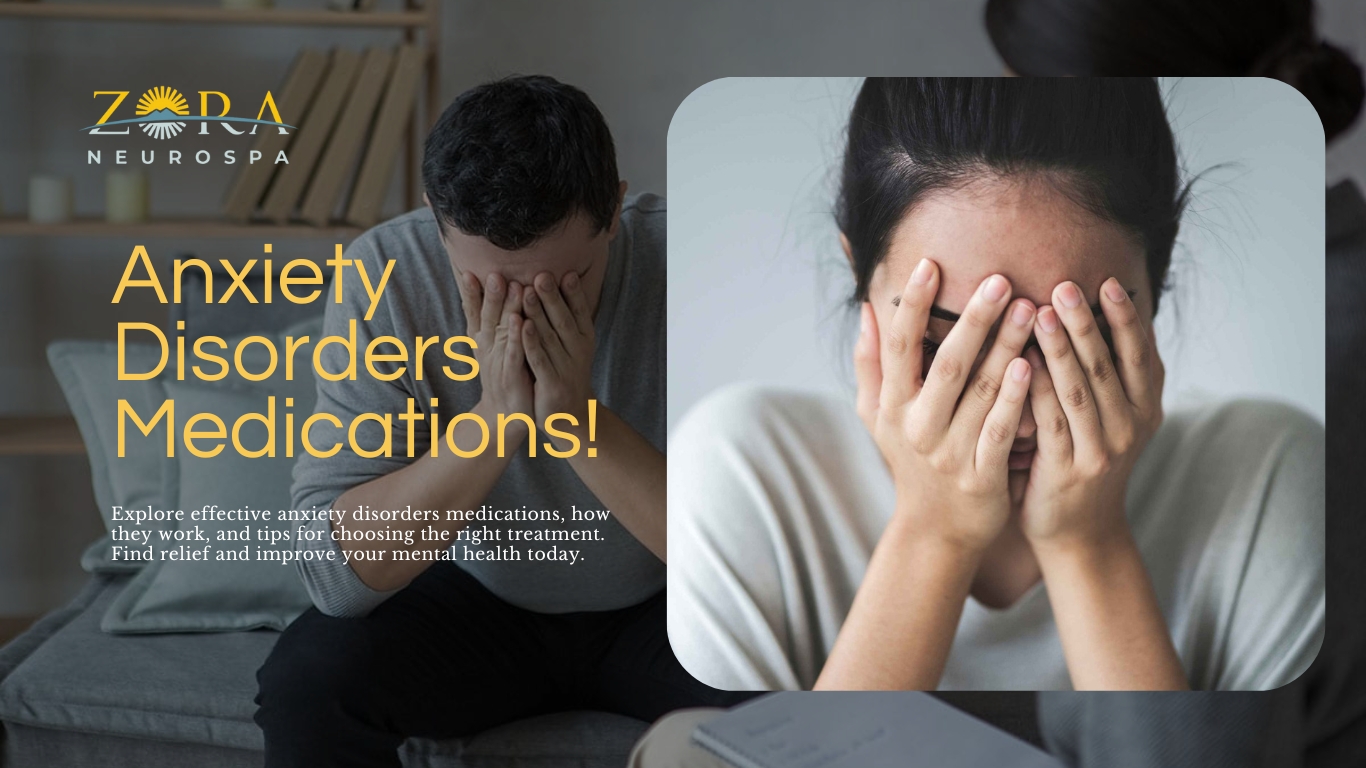
Understanding Anxiety Disorders and the Medications That Can Help
Anxiety disorders are among the most common mental health conditions, affecting millions of people worldwide. They can manifest in various forms, such as generalized anxiety disorder (GAD), panic disorder, social anxiety disorder, and phobias. While therapy and lifestyle changes are essential components of treatment, medications often play a crucial role in managing symptoms. In this article, we’ll explore the different types of anxiety disorders medications, how they work, and what you need to know to make informed decisions about your mental health.
What Are Anxiety Disorders?
Anxiety disorders are more than just feeling stressed or worried. They involve persistent, excessive fear or anxiety that interferes with daily life. Common symptoms include:
- Restlessness or feeling on edge
- Rapid heartbeat or sweating
- Difficulty concentrating
- Irritability
- Sleep problems
- Avoidance of certain situations
These symptoms can be overwhelming, but with the right treatment, including anxiety disorders medications, many people find relief and regain control of their lives.
When Are Medications Needed?
Medications are often recommended when anxiety symptoms are severe, persistent, or significantly impact daily functioning. They can be used alone or in combination with therapy, such as cognitive-behavioral therapy (CBT). A healthcare provider, such as a psychiatric mental health practitioner, can help determine if medication is right for you.
Types of Anxiety Disorders Medications
There are several categories of medications used to treat anxiety disorders. Each works differently and may be prescribed based on your specific symptoms and needs.
1. Selective Serotonin Reuptake Inhibitors (SSRIs)
SSRIs are often the first line of treatment for anxiety disorders. They work by increasing levels of serotonin, a neurotransmitter that helps regulate mood.
- Common SSRIs: Fluoxetine (Prozac), Sertraline (Zoloft), Escitalopram (Lexapro)
- Benefits: Effective for long-term use, fewer side effects compared to older medications
- Side Effects: Nausea, insomnia, sexual dysfunction
2. Serotonin-Norepinephrine Reuptake Inhibitors (SNRIs)
SNRIs are similar to SSRIs but also affect norepinephrine, another neurotransmitter involved in mood regulation.
- Common SNRIs: Venlafaxine (Effexor), Duloxetine (Cymbalta)
- Benefits: Effective for both anxiety and depression
- Side Effects: Increased blood pressure, sweating, dizziness
3. Benzodiazepines
Benzodiazepines are fast-acting medications that provide quick relief for acute anxiety or panic attacks. However, they are typically prescribed for short-term use due to the risk of dependence.
- Common Benzodiazepines: Alprazolam (Xanax), Lorazepam (Ativan), Diazepam (Valium)
- Benefits: Rapid symptom relief
- Side Effects: Drowsiness, risk of dependence, withdrawal symptoms
4. Beta-Blockers
Beta-blockers are typically used to treat high blood pressure but can also help manage physical symptoms of anxiety, such as rapid heartbeat and trembling.
- Common Beta-Blockers: Propranolol (Inderal), Atenolol (Tenormin)
- Benefits: Effective for situational anxiety (e.g., public speaking)
- Side Effects: Fatigue, cold hands, low blood pressure
5. Tricyclic Antidepressants (TCAs)
TCAs are an older class of antidepressants that can also be effective for anxiety disorders. They are usually prescribed when SSRIs or SNRIs don’t work.
- Common TCAs: Amitriptyline, Imipramine (Tofranil)
- Benefits: Effective for certain types of anxiety
- Side Effects: Dry mouth, constipation, weight gain
6. Buspirone
Buspirone is a unique medication specifically designed to treat anxiety. It works by affecting serotonin and dopamine receptors.
- Benefits: Non-addictive, suitable for long-term use
- Side Effects: Dizziness, headaches, nausea
7. Atypical Antipsychotics
In some cases, low doses of atypical antipsychotics may be prescribed for severe anxiety that hasn’t responded to other treatments.
- Common Atypical Antipsychotics: Quetiapine (Seroquel), Aripiprazole (Abilify)
- Benefits: Can be effective for treatment-resistant anxiety
- Side Effects: Weight gain, sedation, metabolic changes
How to Choose the Right Medication
Choosing the right anxiety disorders medication depends on several factors, including:
- The type and severity of your anxiety
- Your medical history
- Potential side effects
- Whether you have other mental health conditions (e.g., depression)
It’s important to work closely with a psychiatric mental health practitioner to find the medication that works best for you. They can monitor your progress and adjust your treatment plan as needed.
Combining Medications with Therapy
While medications can help manage symptoms, they are often most effective when combined with therapy. Cognitive-behavioral therapy (CBT) is a common approach that helps individuals identify and change negative thought patterns and behaviors. Other therapies, such as exposure therapy or mindfulness-based techniques, can also be beneficial.
Potential Side Effects and Risks
All medications come with potential side effects, and it’s important to discuss these with your healthcare provider. Some side effects, like nausea or dizziness, may go away after a few weeks. Others, such as weight gain or sexual dysfunction, may persist and require a change in medication.
It’s also important to follow your provider’s instructions carefully, especially when starting or stopping a medication. Abruptly stopping certain medications, like benzodiazepines, can lead to withdrawal symptoms.
Lifestyle Changes to Support Treatment
In addition to medications and therapy, lifestyle changes can play a significant role in managing anxiety. Consider:
- Regular exercise to reduce stress and improve mood
- A balanced diet rich in whole foods
- Practicing relaxation techniques like deep breathing or meditation
- Getting enough sleep
- Avoiding caffeine, alcohol, and recreational drugs
Final Thoughts
Anxiety disorders can be challenging, but with the right treatment, including anxiety disorders medications, many people find relief and improve their quality of life. If you’re struggling with anxiety, don’t hesitate to reach out to a healthcare provider. They can help you explore your options and create a personalized treatment plan that works for you.
